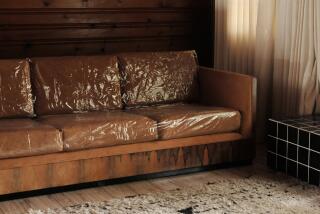FURNISHINGS : Comforters Go Undercover for a Change
- Share via
Colorful bed linens and accessories make it easy and relatively inexpensive to create a new look in the bedroom, and with those big, billowy comforters bed-making is a breeze.
But what to do with the old comforter when you want a new look? It cost too much to pitch, and it’s too bulky to store.
Enter the duvet cover. This fabric envelope, the name French in origin, allows you to slip your old comforter into a new dress--and no one’s the wiser.
Duvet or comforter covers, long a staple in Europe, used to be harder to find than hen’s teeth in the States. If the companies were making them, retailers weren’t ordering them. The consumer was reduced to buying another comforter or stitching a cover from a couple of bedsheets.
But in the past year or so, the covers started catching on with retailers, according to Ana Maria McGinnis, vice president of sales and marketing for the Utica brand of J.P. Stevens.
In the long run, it seems to make sense to buy a quality comforter and duvet cover rather than a comforter made to match. That’s exactly what’s happening.
“The down business is taking off in stores all around the country,” says Dale Williams, senior vice president of Pillowtex Corp. of Dallas. The company, said to be the largest distributor of down comforters and pillows in the nation, is selling down even to chain and discount stores.
But not everyone wants down. It doesn’t launder and it is allergenic. New polyester fiberfill constructions may be for them.
Several new products are spun from ultra-thin fibers. They approximate the warmth of down but are washable and non-allergenic. Among them are Polarguard by Hoechst Celanese, Primaloft by Albany International and Comforel by DuPont. Comforters filled with Polarguard and Primaloft are currently available. Comforel is expected in stores by winter.
“Although there are differences in warmth-to-weight ratios and draping characteristics, they all have similar advantages,” Williams says. “They attempt to offer the warmth of down with the washability and non-allergenic properties of polyester.”
The new fiberfills are not necessarily cheaper than down. Prices for a plain premium polyfiber-filled comforter in twin size range from about $80 to $150, more for larger sizes. To this, add the cost of a decorative cover.
Still, buying a durable comforter in a plain cover and changing the look with new covers is a good way to deal with the urge to splurge on a new set of bed linens.


